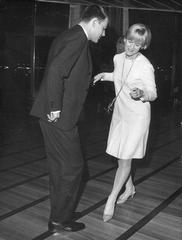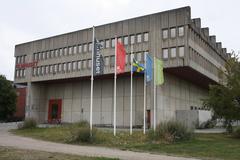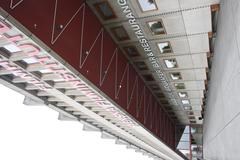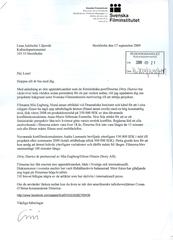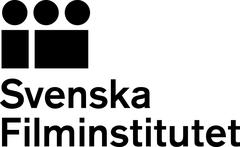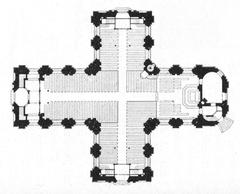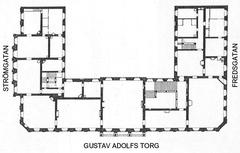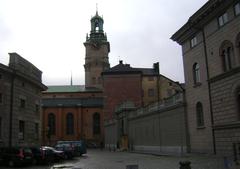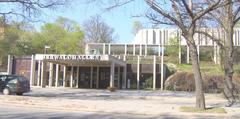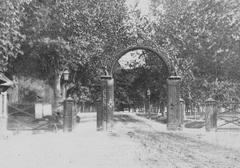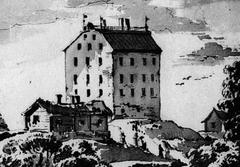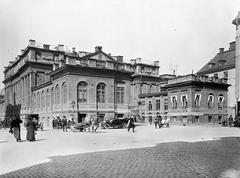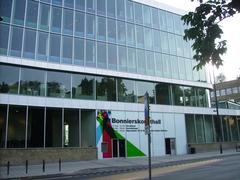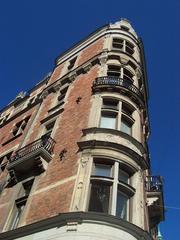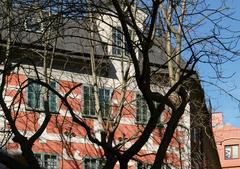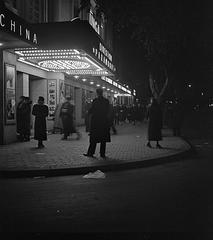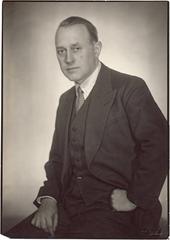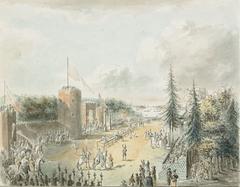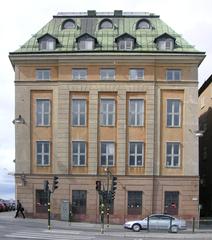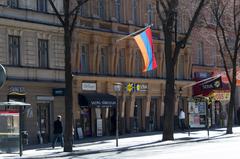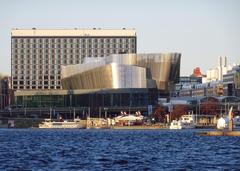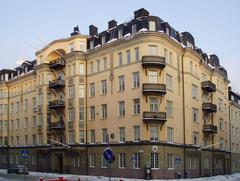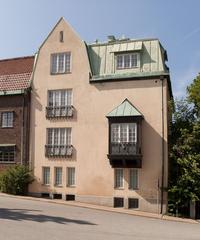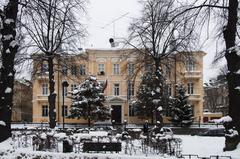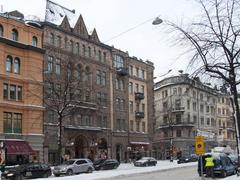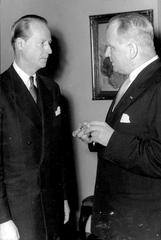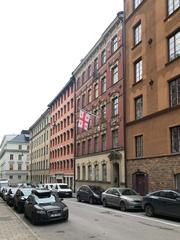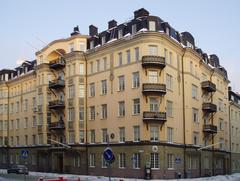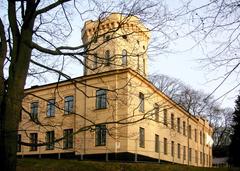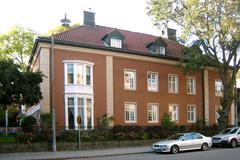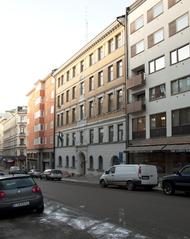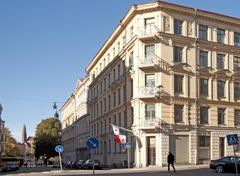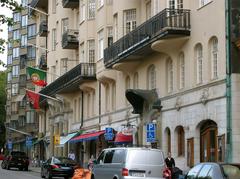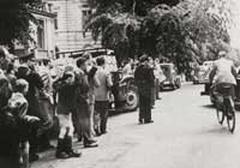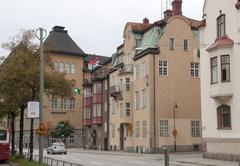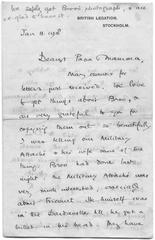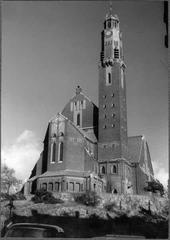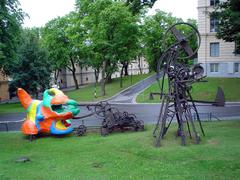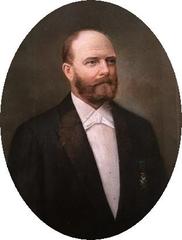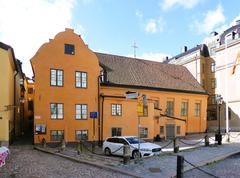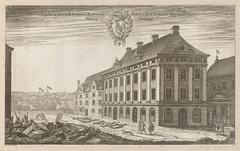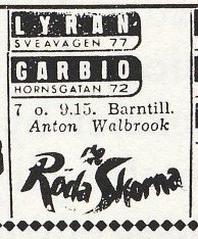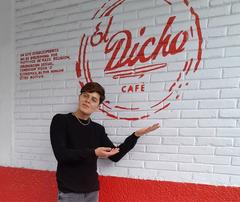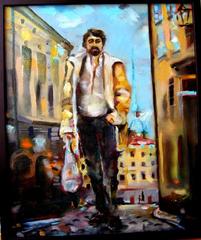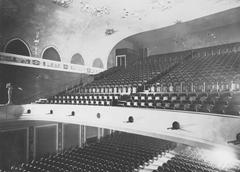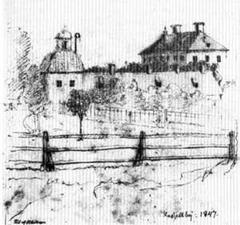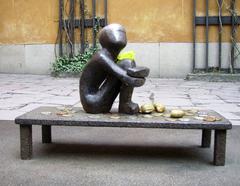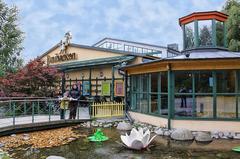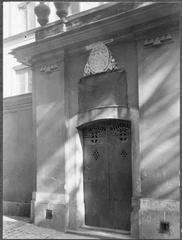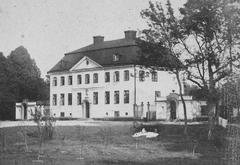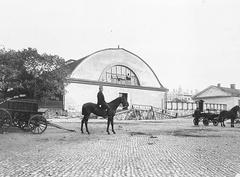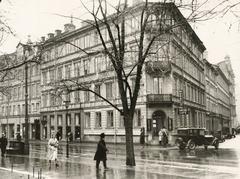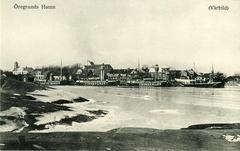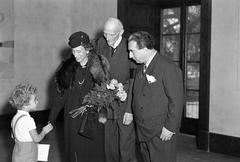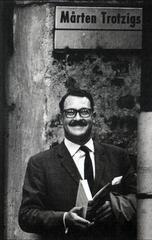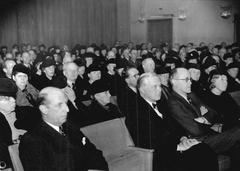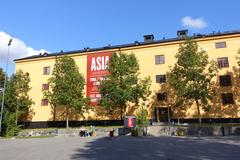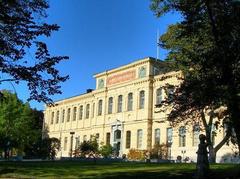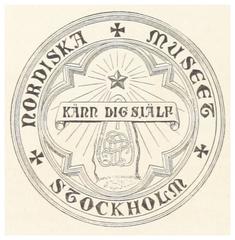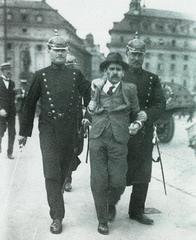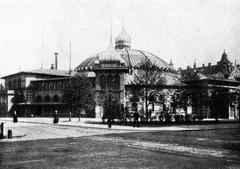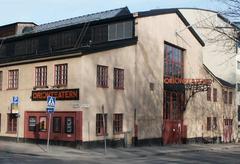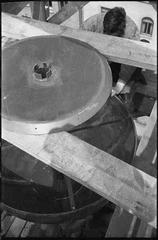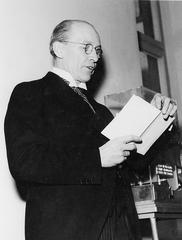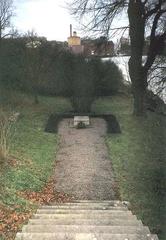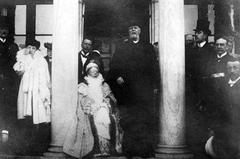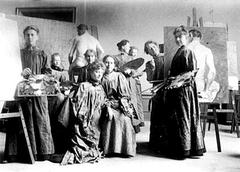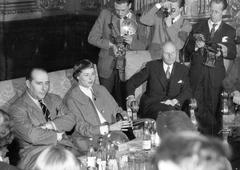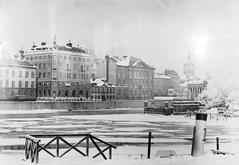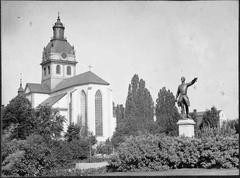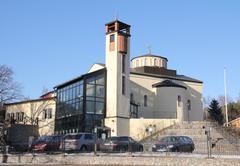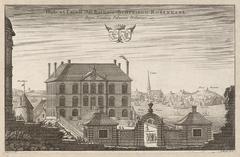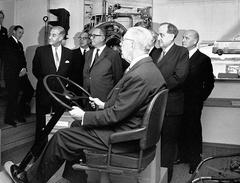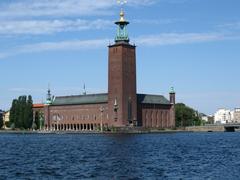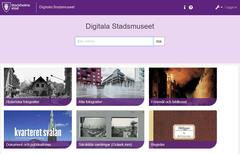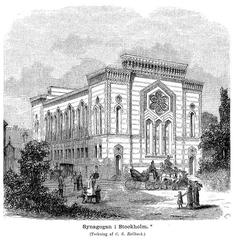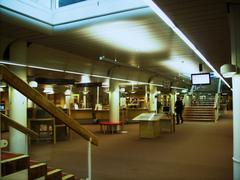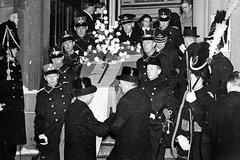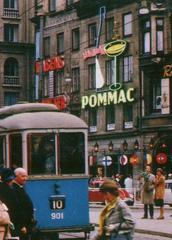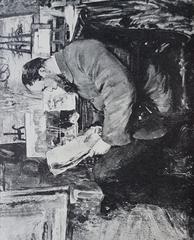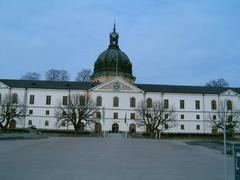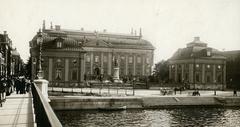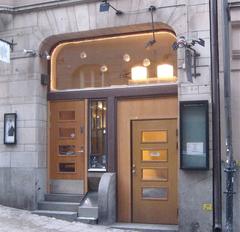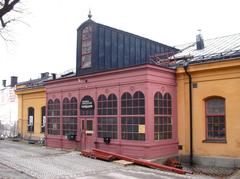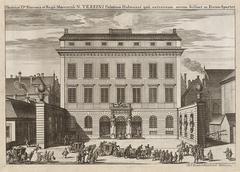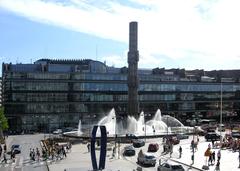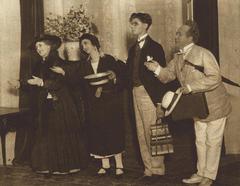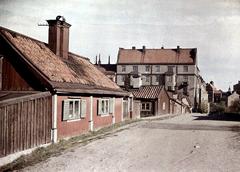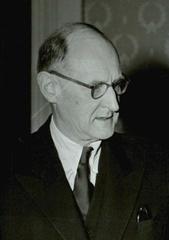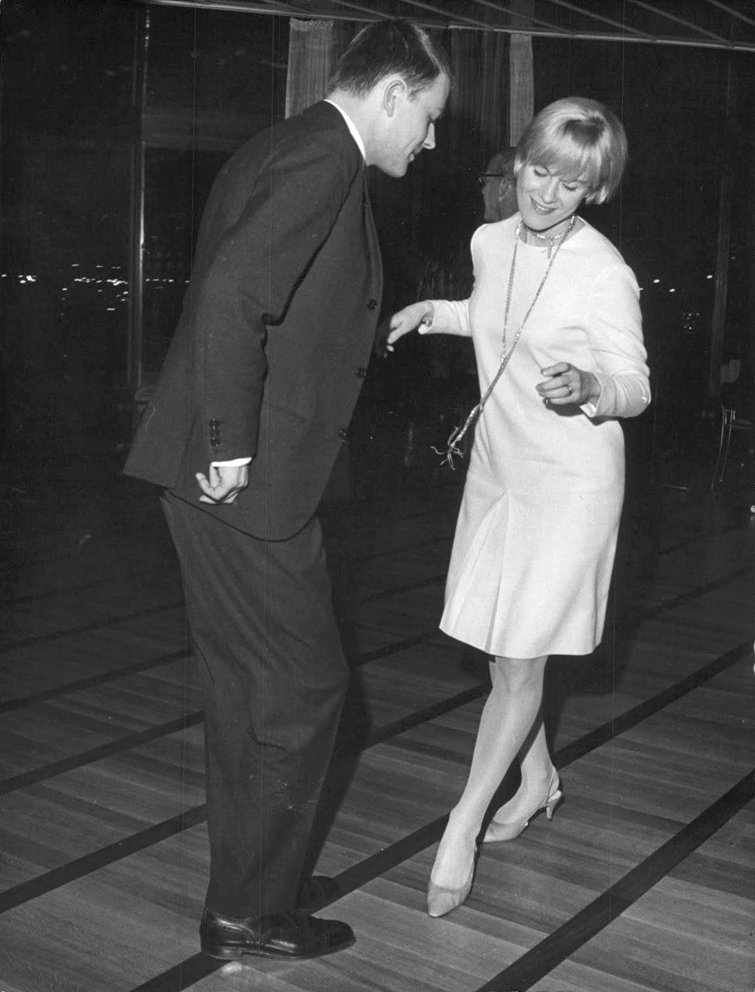
Swedish Film Institute Stockholm: Visiting Hours, Tickets & Complete Guide
Date: 14/06/2025
Introduction: Discover Sweden’s Cinematic Heart
The Swedish Film Institute (Svenska Filminstitutet), established in 1963, is a cornerstone of Sweden’s film culture and heritage. Created through a collaborative agreement between the Swedish government, the national film industry, and broadcasters, the Institute was designed to promote, support, and develop Swedish cinema as both an art form and an essential cultural asset. Its founding marked a transformative era for Swedish film, nurturing talents like Ingmar Bergman and fostering a vibrant national cinematic identity (Cinando; Academia.edu).
Located in the iconic Filmhuset building in Stockholm’s Östermalm district, the Institute is not just a hub for film production and preservation but also a dynamic public venue, offering screenings, exhibitions, educational programs, and Sweden’s largest film archive. Filmhuset’s striking brutalist architecture, designed by Peter Celsing, stands as a symbol of the nation’s commitment to cinematic innovation (Visit Stockholm; A house Filmhuset).
This guide explores the Institute’s history, cultural significance, visitor information, and practical tips to help you make the most of your visit.
Table of Contents
- History and Mission
- Preservation & Archives
- International Promotion
- Visiting the Swedish Film Institute
- Filmhuset: Architecture & Facilities
- Special Events and Festivals
- Practical Visitor Info
- Frequently Asked Questions (FAQ)
- Tips for a Memorable Visit
- Cultural Impact & Societal Significance
- Summary & Planning Resources
- References
History and Mission
Founding and Early Development
The Swedish Film Institute was established in 1963 through a partnership between the government, film industry, and broadcasters. Its mandate was to support and develop Swedish film as an art form and a cultural resource (Cinando). The 1960s marked a turning point, with a new generation of filmmakers—like Ingmar Bergman—gaining international acclaim and addressing complex social and psychological themes (Academia.edu).
Mission and Mandate
The Institute’s responsibilities include:
- Allocating grants for film production and distribution
- Supporting public exhibition and access to Swedish films
- Promoting Swedish cinema internationally
- Preserving Sweden’s film heritage via the national archive and Cinemateket (Cinando)
Its mission evolves with the media landscape to reflect Sweden’s cultural policies and societal goals.
Swedish Cinema Before the Institute
Prior to 1963, Swedish cinema was shaped by pioneers like Victor Sjöström and Mauritz Stiller. The industry faced challenges from international competition and market changes, highlighting the need for a dedicated support institution (Academia.edu).
The Institute’s Role in the 1960s and 1970s
The SFI ushered in a renaissance for Swedish film, fostering artistic innovation and international success. Funding mechanisms enabled ambitious projects, and Swedish filmmakers won major festival awards, strengthening global recognition (Academia.edu).
Preservation & Archives
A vital part of the SFI’s mandate is safeguarding Sweden’s film legacy. The national film archive houses thousands of films, scripts, photographs, and documents, serving as a resource for researchers, filmmakers, and the public (Cinando). Cinemateket screens classic and contemporary films, keeping the country’s cinematic heritage alive for new generations.
International Promotion
The Institute actively promotes Swedish cinema worldwide by organizing festival participation, supporting subtitling and co-productions, and collaborating with institutions like the Swedish Institute (Cinando). These efforts have ensured a strong Swedish presence at Cannes, the Academy Awards, and beyond.
Visiting the Swedish Film Institute
Location
- Address: Borgvägen 1–5, 115 53 Stockholm (Östermalm/Gärdet district)
- Easily accessible via the Karlaplan metro station and several bus lines (Routes North).
Opening Hours
- General Opening: Monday–Friday, 10:00 AM–5:00 PM
- Cinemas & Events: Extended evening and weekend hours during screenings and festivals (Swedish Film Institute official website)
- Library: Check library opening hours for seasonal changes
Tickets & Admission
- Exhibitions & Library: Free entry
- Screenings: Tickets required; available online or at the venue. Student and senior discounts often available.
- Special Events: May require separate tickets; check event listings in advance
Guided Tours
- Availability: Offered occasionally and by appointment; focus on film history, architecture, and archives. See the official website for schedules.
Accessibility
- Facilities: Wheelchair accessible, with ramps, elevators, and accessible restrooms (Filminstitutet Accessibility)
- Support: Staff assist with special needs; info available in Swedish and English
Travel Tips
- Use public transport due to limited parking
- Combine your visit with nearby attractions: ABBA Museum, Skansen, Stockholm City Museum, National Library
Filmhuset: Architecture & Facilities
Architectural Marvel
Filmhuset, designed by Peter Celsing and completed in 1971, is a prime example of Brutalist architecture. Its façade evokes film reels, and interior spaces pay tribute to cinema’s visual language (A house Filmhuset; Visit Stockholm). The building’s cultural value is recognized by Stockholm City Museum (Wikipedia).
Cinemas & Screenings
- Bio Victor & Bio Mauritz: State-of-the-art cinemas named after legendary Swedish filmmakers. Host daily screenings, festivals, and special events (Filminstitutet Cinemas).
- Cinemateket: Public film club offering curated programs, ranging from auteur classics to rare discoveries (Filminstitutet Cinemateket).
Library & Research
Sweden’s largest film library is located on the fourth floor, open to the public and researchers (Filminstitutet Library). The archive includes books, magazines, scripts, and the Stills and Posters Archive (visitable by appointment).
Community & Events
- A house: Creative coworking and event space on the fourth floor, offering memberships and hosting workshops, lectures, and networking events (A house Filmhuset).
- Café & Restaurant: Ideal for breaks and informal meetings.
- Filmrummet: Seminar and event space for film professionals and the public.
Special Events and Festivals
- Stockholm International Film Festival: Filmhuset is a main venue for premieres, masterclasses, and industry days (Routes North).
- Cinemateket Programs: Thematic series, retrospectives, and Q&A sessions with filmmakers (Filminstitutet Cinemateket).
- Educational Workshops: Programs for children, youth, and adults to foster film literacy.
Practical Visitor Info
- Photography: Allowed in public areas; may be restricted during screenings/events
- Dining: On-site café serves coffee, snacks, and meals
- Souvenirs: Books, posters, and DVDs sometimes available in the library and café
Frequently Asked Questions (FAQ)
What are the opening hours?
General hours are Monday–Friday, 10:00 AM–5:00 PM. Cinemas and events often run evenings and weekends.
Is there an entrance fee?
Entry to exhibitions and the library is free; screenings/events require a ticket.
Are guided tours available?
Yes, by appointment and for special events.
Is the Institute accessible for visitors with disabilities?
Yes, with ramps, elevators, and accessible restrooms.
How do I get there?
Take the metro to Karlaplan or buses to Gärdet; limited parking is available.
Tips for a Memorable Visit
- Book tickets in advance for popular screenings or festivals.
- Visit the library for a deep dive into Swedish and international cinema.
- Check for special exhibitions and masterclasses.
- Explore the architecture—guided tours are occasionally available.
- Combine your visit with nearby museums and attractions in Östermalm and Djurgården.
Cultural Impact & Societal Significance
The Swedish Film Institute is deeply woven into Sweden’s identity, reflecting national values like democracy, diversity, and freedom of expression (Cultural Policies Sweden, 2023). The SFI supports underrepresented filmmakers, promotes gender equality, and enriches Sweden’s global reputation by showcasing its cinema abroad.
Educational initiatives, collaborations with cultural institutions (like the Royal Library and Sámi Parliament), and public events foster media literacy and social cohesion. The SFI’s adaptive policies ensure Swedish cinema remains relevant amid technological and societal change (SFI official site).
Summary & Planning Resources
The Swedish Film Institute at Filmhuset merges historical legacy with contemporary innovation. Visitors can enjoy screenings, explore exhibitions, access the film library, and engage with Sweden’s vibrant cinematic community. Its commitment to accessibility, diversity, and public engagement makes it a must-see destination in Stockholm.
- Check the official website for the latest on hours, ticketing, programs, and events.
- Download the Audiala app for curated audio guides and event notifications.
- Follow SFI/Filmhuset on social media for news and updates.
References
- Cinando, The Swedish Film Institute
- Academia.edu, A short history of Swedish cinema
- Cultural Policies Sweden, 2023
- Swedish Film Institute official website
- Visit Stockholm, Filmhuset
- A house Filmhuset
- Routes North, Stockholm for film fans and photographers
Experience Swedish cinema at its source—plan your visit to the Swedish Film Institute and immerse yourself in a unique blend of culture, history, and creativity.
